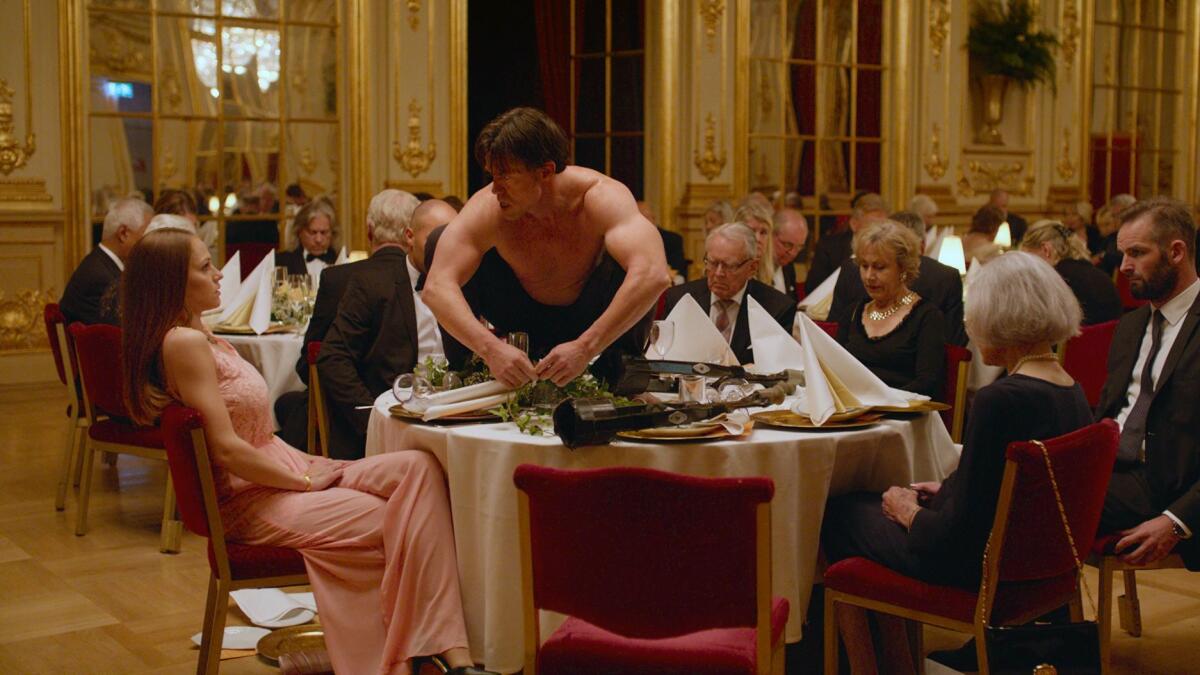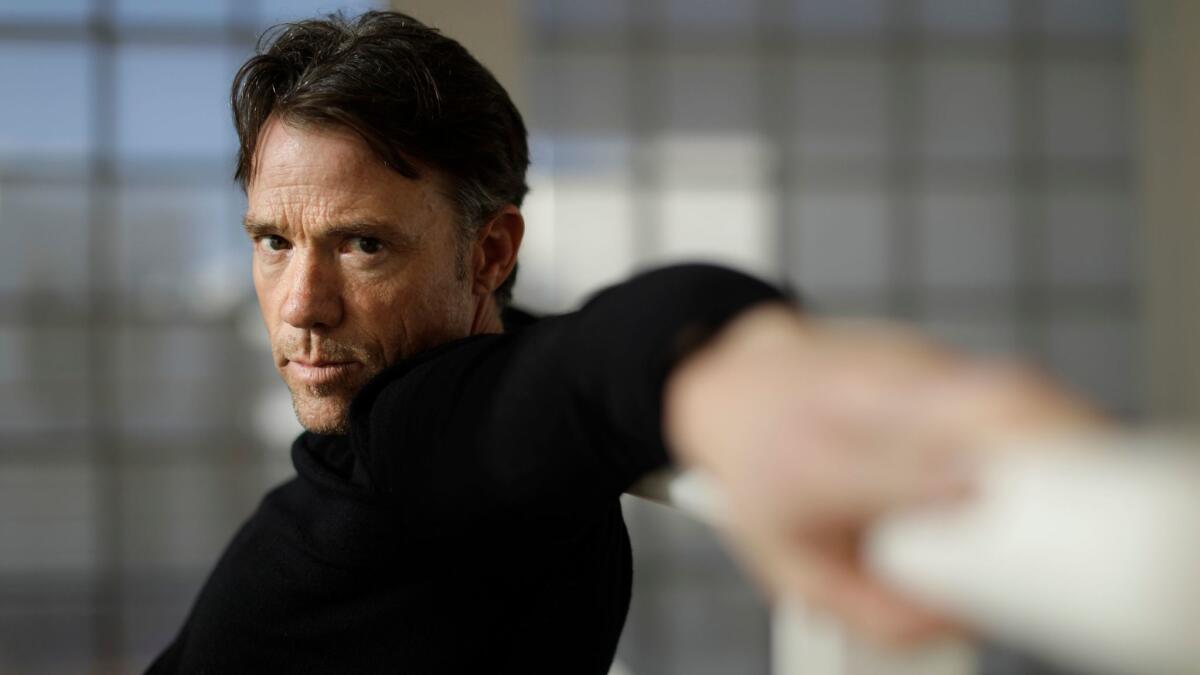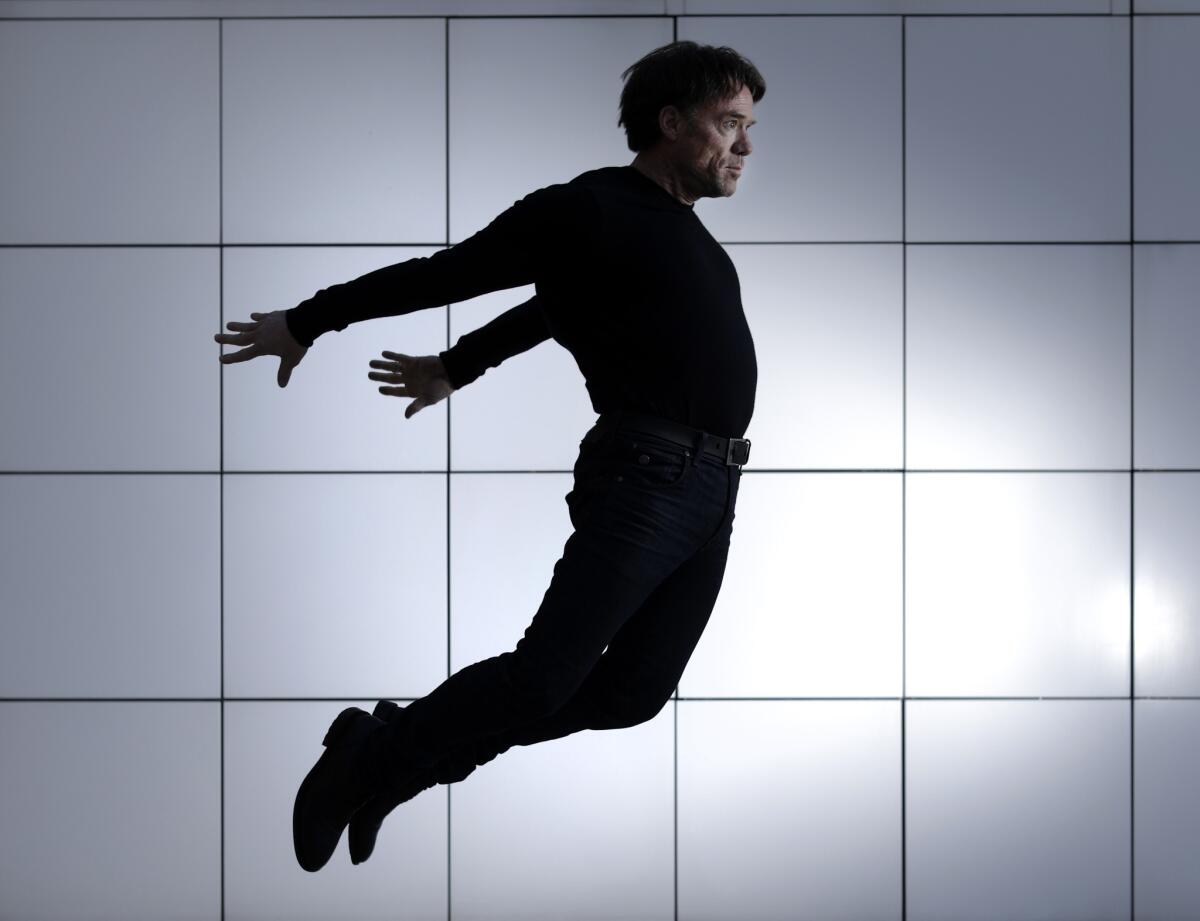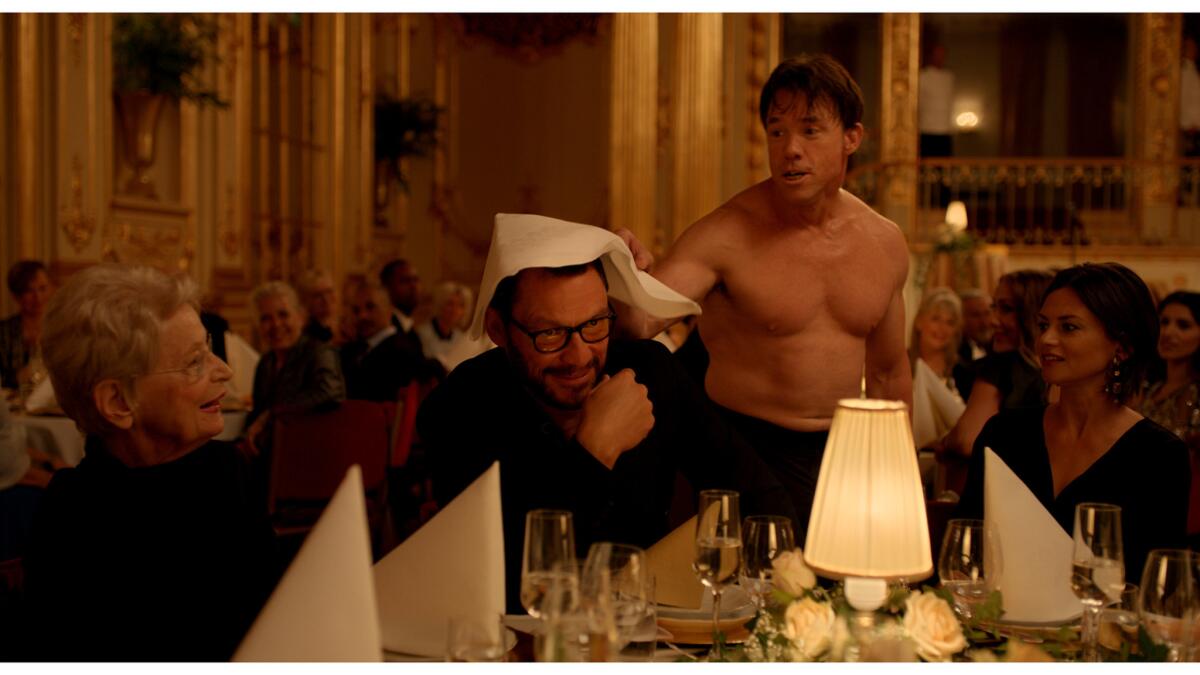Artist Terry Notary explains that uncomfortable dinner scene in Oscar contender ‘The Square’

Terry Notary has performed many motion-capture roles. But in the art-world satire “The Square,” he shows his face and goes ape crazy as movement artist Oleg. The Swedish comedy is nominated for the foreign-language film Oscar.
- Share via
If you've seen Ruben Östlund's wonderfully abstract sendup of the art world "The Square," which is up for a foreign language Oscar, one scene stands out. It takes place at a formal dinner gala full of billionaire museum donors, an atmosphere of quiet desperation and a shirtless man impersonating an ape.
“Ruben called me up and said, 'I want you to come in and be a movement artist and an ape impersonator and terrorize this group of donors at this very fancy gala,'" says actor and movement coach Terry Notary, who plays performance artist Oleg in the film. "And I'm like, 'That sounds fun. That sounds like a challenge. Let's do it!'"
On set, the motion capture actor and teacher was given relatively free rein. After all, playing an ape wasn’t new territory for Notary. In addition to his work on "How the Grinch Stole Christmas," "Suicide Squad," “Avatar,” “The Hobbit” films and more, he played displaced alpha chimp Rocket in the "Planet of the Apes" reboots and the ultimate great ape in "Kong: Skull Island."
Even so, there was an element of uncertainty Notary had to deal with in “The Square,” mostly by design. He knew that the scene would last between eight and 12 minutes and wouldn't include any dialogue. But, Notary admits, “We didn't really know what we were going to do when we got there. There was an empty room with a bunch of tables and the next day there were going to be 300 extras in there.”
Östlund wanted to rehearse a few takes in the empty room, but Notary had other ideas.
"I thought, 'You know what? We have to wait until the extras get here because I'm going to react to them,'" he says. "I'm not going to tell them what to do, their reactions are going to govern how I play the scene."
But about those extras — Östlund had his own surprise for Notary.
"He didn't tell me that all the people in the room were actual billionaire donors, gallery owners, artists and very well-to-do bourgeois art scene people," Notary says with a laugh. "It was only after the third [and final] day of shooting [that he told me]."

Once the extras arrived on set, Notary tried to elicit authentic reactions by keeping his plans organic.
"I didn't want to go in knowing, 'I'm going to do this to this person and that to that person," he says. "I wanted to go to all the people that didn't want to be picked. Because there were some people that would come up to me in the scene and go, 'Hey, pick me, we'll do a little fight if you want.' And I thought, 'Hmm, no, I'm not going to pick you. I'm going to pick that lady over there that doesn't want to be picked. She's been looking away from me all day. Because then you get the real reactions, the real tension."
After sizing up the extras, he began to formulate a course of action in his head.
"I knew that I wanted to win their hearts in the beginning," he says. "And then gang up on the alpha male in the room, kick the alpha male out, become the alpha and then turn on everyone else who ganged up on him with me and say, 'Okay, who's next? Now it's time to teach you what it feels like to be bullied or to be scared.'"

In the scene, Notary’s character Oleg quickly identifies the alpha as a fellow artist named Julian, played by Dominic West.
"So Dominic, I'd never met him before," Notary admits. "We did that take twice and they chose the second take. The first take, when he went up the balcony, he actually picked up a vase full of flowers and water and threw it at me. And it shattered all over the stage and I thought, 'That's got to be in the movie, that's going to be the one.' But he didn't pick it and I was surprised because I thought it was a better take."
With the alpha taken care of, Oleg goes on to terrorize the rest of the guests to disastrous results for the gala.
"Ruben said, 'Why don't you take over, start pointing out how weak everyone is and then breed with the prettiest girl in the room?" Notary says with a laugh. "And I was like 'Oh boy, okay. Now we're going to the next level."

When watching the film, the scene — which the camera lingers on unflinchingly — unfolds with such palpable discomfort and mounting tension that it feels even longer than its twelve minutes.
"The little story became its own mini three-part movie within a movie," Notary says. "It felt like a little tiny short within the film." That, the movement artist says, is part of the genius of Östlund.
"One of the great things about Ruben is that he really lets things play out in real time and he lets tense moments unfold as they would rather than trying to rush them and cut in quicker bites and pieces," Notary says. "He doesn't try to tell the story with too many camera angles, he just allows the moment to play out and you sort of watch as a spectator.
"He almost shot it in a way that you felt like you were sitting in the audience in that gallery, you felt like you were a part of it," he adds.
While many of the film’s audience members left the theater scratching their heads at the meaning of the scene, Notary manages to distill its purpose into a single word: complacency.

"I wanted to point out how complacent we are as human beings," he says. "And how when fear takes hold of the group you really just become paralyzed and you don't want to do anything, you just want to hide. If Oleg could speak in the scene he would say, 'How far do I have to go to get you off your butts and out of your complacent state in order to do something and to take action?"
"It's sort of a universal thing," he continues. "Because I think we've all felt that at one point in our lives. Like, you've been picked on or taken advantage of and you didn't say anything. And half an hour later you go, 'God, I wish I would've said this,' or 'I wish I would've done this or that.' Well, we should learn from these things and we should speak out when things are not right, or things that are not what you believe in and stand up. So that's what it was for me."
More on “The Square”
follow me on twitter @sonaiyak
Only good movies
Get the Indie Focus newsletter, Mark Olsen's weekly guide to the world of cinema.
You may occasionally receive promotional content from the Los Angeles Times.








